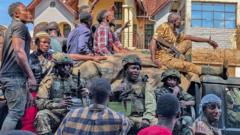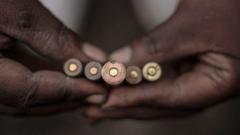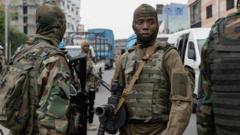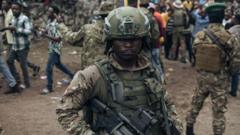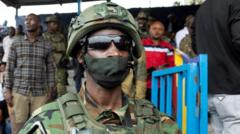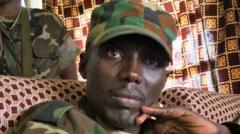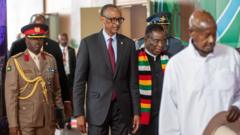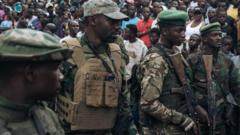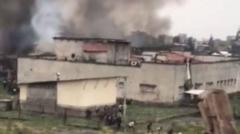The M23 rebels, backed by Rwanda, have reportedly taken control of Bukavu, a key trading hub in eastern Congo, following the recent fall of Goma. This development underscores the turmoil within the Congolese military and raises questions about the future stability of the region.
M23 Rebels Capture Bukavu: Shifting Power Dynamics in Eastern Congo

M23 Rebels Capture Bukavu: Shifting Power Dynamics in Eastern Congo
The M23 rebel group has made significant advances in eastern Congo, capturing the crucial city of Bukavu amid reported shortcomings of the Congolese army and backing from Rwanda.
Rebels in the eastern Democratic Republic of Congo have reportedly entered Bukavu, a vital trading center and gold hub, amid claims of minimal resistance from the military. This development follows the rebels’ capture of Goma last month, further indicating the escalating influence of the M23 group, which receives support from Rwanda.
Witnesses reported that M23 fighters marched into Bukavu in extended lines on Sunday, declaring their presence in the city. "We’re there, we’re there in Bukavu,” stated Willy Ngoma, a spokesperson for the M23, via phone. Eyewitness accounts and social media posts corroborate their entry, although the Congolese government has remained silent regarding these events.
The recent shift highlights the vulnerability of the Congolese army, which reportedly evacuated from Bukavu in a disorganized fashion just days prior to the rebels' advance. The fall of Bukavu—home to over a million residents and located near a picturesque lake—could signify a critical juncture for both the M23 and the Congolese government.
In stark contrast to the fierce and bloody conflict witnessed during the siege of Goma, which resulted in nearly 3,000 fatalities as reported by the United Nations, the takeover of Bukavu appears to have occurred with relative ease for the rebels. Should they solidify their control over Bukavu, M23 would dominate two of Eastern Congo's principal trading centers, intensifying concerns regarding regional stability and control over the area's valuable mineral resources.
The implications of M23's advance raise alarms not only within Congo but also among neighboring states, given the historical tensions and past conflicts linked to proxy support and ethnic strife in the region. The increasing grip of M23 suggests a complex and potentially volatile future for Eastern Congo, where external influences and internal divisions appear to interlace deeply.



